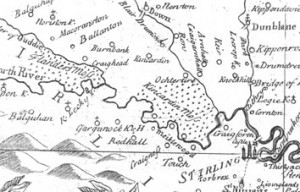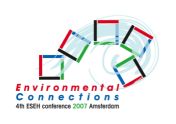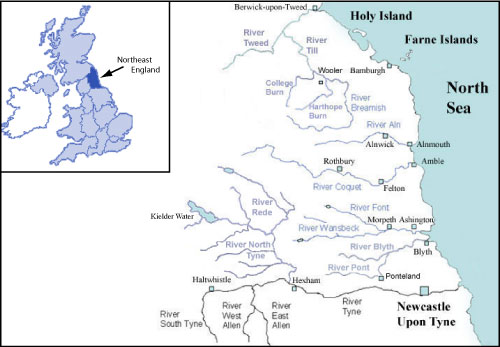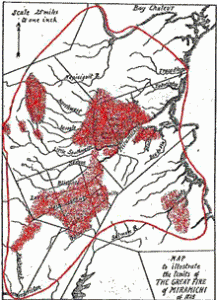The theme of this podcast is the history of severe river flooding in the north east of England. With the floods in the town of Morpeth in September 2008 fresh in the minds of people in Northern England it seems appropriate to look back in time to great historic floods and to see whether the rivers of Northumberland have produced even greater floods than those experienced recently. The guest on this podcast is David Archer, a retired hydrologist who worked for Northumbrian Water and the National Rivers Authority, and an expert on the history of floods in the North east of England. He will explore the great floods in the Tyne basin of the past 250 years and even beyond. In addition David will discuss what historical sources are used for the reconstruction of past floods and how such information can be used for current flood risk management.
Author: Nkjwo (page 6 of 7)
This edition of the podcast is devoted to two countries of European Settlement: New Zealand and Canada. Both countries received a significant number of settlers from Scotland and Ireland. Did these groups bring a particular set of land management techniques with them that had a particular impact on the landscape and environment? Did a particular conservation ethic develop among Scottish and Irish settlers? Tom Brooking of Otago University discusses these questions in this podcast. In addition he is looking at the unique nature of the environmental history of New Zealand and how the country has become as cultivated as most “old world” countries.
In the second part of the podcast Alan MacEachern, a historian of the University of Western Ontario, explores the confrontation of European settlers with the extensive forests in eastern Canada through the Miramichi fire of 1825. This fire is considered to be one of the largest ever recorded on the east coast of North America since European settlement. The fire took settlers by surprise because it was on a scale unknown to immigrants coming from a largely deforested continent. Alan discusses the causes of the fire, the responses to the fire and how it was reported in the European press.
The Interviews were recorded at a one day conference entitled “Irish and Scottish Migration and Settlement: Environmental Frontiers”, held at the AHRC Centre for Irish and Scottish Studies, University of Aberdeen, 21 June 2008.
Websites mentioned in this podcast:
NiCHE
Anne is a Man podcast reviews, anneisaman.blogspot.com
 This episode of the podcast returns to Scotland for a look at the environmental history of Flanders Moss, a raised peat bog west of Stirling. John Harrison, a historian from Stirling, reveals why the moss is the product of millennia of human use and exploitation. In addition he will address the questions what the moss looked before human intervention, why large parts of the moss were cleared during the 18th and 19th centuries, and some of the environmental consequences of the clearance. The podcast will also dispel the myth that the moss was once an impassible barrier, with Stirling Bridge the only place where it could be crossed. Finally, the history of Flanders Moss during more recent times, including a proposal to mine the peat to fuel a power station, and its role in the 21st century as the largest raised bog in lowland Scotland will be briefly discussed.
This episode of the podcast returns to Scotland for a look at the environmental history of Flanders Moss, a raised peat bog west of Stirling. John Harrison, a historian from Stirling, reveals why the moss is the product of millennia of human use and exploitation. In addition he will address the questions what the moss looked before human intervention, why large parts of the moss were cleared during the 18th and 19th centuries, and some of the environmental consequences of the clearance. The podcast will also dispel the myth that the moss was once an impassible barrier, with Stirling Bridge the only place where it could be crossed. Finally, the history of Flanders Moss during more recent times, including a proposal to mine the peat to fuel a power station, and its role in the 21st century as the largest raised bog in lowland Scotland will be briefly discussed.
Website mentioned in this podcast: SNH NNR page
This podcast episode highlights two papers presented at a conference entitled “An End to History? Climate Change, the Past and the Future” that that was held at the Birmingham and Midland Institute in Birmingham on 3 April 2008. The papers presented addressed the issue what we can or can not learn from the experiences of past societies which have coped with climate or environmental change. In this episode Gill Chitty, Head of Conservation of The Council for British Archaeology, explores the important contributions that archaeology can make to the national debate about climate change. Jim Galloway of the Centre for Metropolitan History, Institute of Historical Research in London, reviews the evidence of the impact of storm surges on the lands bordering the Thames Estuary during the fourteenth century.
Website mentioned in this podcast:
Rescue!History, rescue-history-from-climate-change.org
Urban air pollution is certainly not a new problem. During the Middle Ages the use of coal in cities such as London was beginning to increase. By the the 17th century the problems of urban air pollution are well documented.
The Industrial Revolution in the 18th and 19th centuries was based on the use of coal. In addition the burning of coal in homes for domestic heat pusehed urban air pollution levels further up with sometime disastrous results. The Great London Smog of 1952 resulted in around 4,000 extra deaths in the city, and led to the introduction of the Clean Air Acts of 1956 and 1968.
The problems realated to air pollution, past and present, are well known but less known is the cultural history attached to air pollution. In this edition of Exploring Environmental History Stephen Mosley of Leeds Beckett University explores how Victorians and Edwardians viewed air pollution and how they dealt with it. He also suggests that there is a continuation of perceptions of air pollution that links us with the Victorians.
Second of two episodes devoted to environmental history of South Africa. In this episode South African historian Phia Steyn explores the environmental consequences of the industrial development and militarization of South Africa during the Apartheid era and how it influenced environmental policies in the post-apartheid period. In the second half of the podcast Phia talks about her present research which looks at the origins of the African rinderpest outbreak and its consequences for the young Orange Free State in the 1890s.
First of two episodes devoted to environmental history of South Africa. South Africa is one of the most culturally and ecologically diverse countries in the world. Different cultures interpret and understand nature in different ways and that was nowhere more visible than in colonial South Africa. In this episode Elizabeth Green-Musselman, a historian of science based at the Southwestern University in Georgetown, Texas, explores how a hybridized knowledge of nature developed in the cape colony blending local and European knowledge. The issues discussed include the impact of European cultivation, conflicts over natural resources and the role of naturalists in conservation and what they learned from local guides during botanical expeditions during the 18th and 19th centuries. The podcast concludes with a brief consideration of the benefits of the interactions and collaboration between environmental historians and historians of science.
Websites mentioned in this podcast:
- Missing Link Podcast, missinglinkpodcast.wordpress.com
- African Environmental History at Boston University (No longer active)
Global warming is not the first global environmental threat that humanity is facing. The thinning of the protective ozone layer caused by chlorofluorocarbons (CFCs) was the first global environmental threat. It led to a concerted global action to ban CFCs by the 1990s to correct the problem. This edition of the podcast considers what lessons can be learned from this environmental problem for dealing with global warming. It suggests that not applying the cautionary principle to the ozone thinning in the 1970s led to the emergence of the so called hole in the ozone layer.
In the second half of the podcast Dr Liza Piper of the University of Alberta explores how the settler societies in Arctic Canada are to a large extent influenced and determined by the climatic conditions during the last stages of the Little Ice Age.
Websites mentioned in this podcast:
This edition of the podcast reports on a conference entitled History and Sustainability which was held at the University of Cambridge’s Centre for Research in the Arts, Humanities and Social Sciences on 6 and 7 September 2007. This conference explored how history can make contributions to the debate about sustainability and the education of sustainability. This was an exercise in thinking about the theoretical and methodological challenges that the discipline faces as well as the question of the place of environmental history in the academic spectrum and curriculum.
Paul Warde, co-organiser of the conference, explains on this podcast the rationale of the meeting, which is that sustainability, as a concept can only be understood historically because it is about survival over time. Sverker Sorlin, explains why we need to infuse the environment as a concept into historical thinking and that environmental historians play a crucial role in this process. Kate Showers, Research Fellow at the University of Sussex, talks about the importance of disciplinary synthesis for environmental history. Finally, Libby Robin of the National Australian Museum explores the the long now and the big here.
Websites mentioned in this podcast:
- Long Now Foundation website, www.longnow.org
- Missing link podcast
What have historians and other humanities scholars to contribute to the understanding of global warming and informing solutions of this environmental problem? This is the central question of the interview on this podcast with Mark Levene, a Historian based at the University of Southampton, and founder of Rescue!History. He will also talk about the manifesto he wrote urging historians and other humanities scholars to get involved and contribute to the debate and understanding of global warming.
In the second half of the podcast Bill Turkell, author of Digital History Hacks, environmental and digital historian at the the University of Western Ontario, explains how historians can make better use of the web, looks at the developement of an online environmental history research infrastructure in Canada and how the use of programming languages can improve historical instruction. He also talkes about the Network in Canadian History & Environment (NiCHE).
 This special edition of Exploring Environmental History reports on the fourth conference of the European Society for Environmental History which was held at the Free University Amsterdam from 5 to 9 June 2007. The podcast will highlight some of the themes of the conference and includes interviews with presenters on the following topics: the history of pollution, environmental history of the polar regions, marine environmental history and environmental history of war.
This special edition of Exploring Environmental History reports on the fourth conference of the European Society for Environmental History which was held at the Free University Amsterdam from 5 to 9 June 2007. The podcast will highlight some of the themes of the conference and includes interviews with presenters on the following topics: the history of pollution, environmental history of the polar regions, marine environmental history and environmental history of war.
Around 1850 Britain had no forestry service and there was no formal training of foresters. Forestry was still practised in the context of estates mainly owned by the aristocracy and managed by foresters who had learned the traditional management techniques under an apprentice system from their predecessors. British forestry was fragmented, not formalised, and far from centralised during the entire 19th century. Most of the forestry remained concentrated on large privately owned estates, especially in Scotland, where it served the double purpose of ornamental woods and, to a lesser extent, wood production for local use.1The British Government and many landowners did not feel the necessity to increase timber production and introduce modern formalised forestry practices from the continent because the British had direct access to the large timber reserves of their Empire, of Scandinavia and the Baltic states. Importing timber from overseas was much cheaper than to produce it back home in Britain.2 Continue reading
Richard Oram, Director of the Centre for Research in Environmental History, University of Stirling, talks about recent developments in Scottish Environmental History. Issues discussed include how the Scottish landscape is not as natural as it appears and has been exploited for at least hundreds of years; the transformation of land management practices; energy resource management, including wood, peat and coal and how people responded to fuel shortages in the past; woodland management; the organisation of the landscape into Davochs and urban environmental history.
This podcast is entirely devoted to Australian environmental history. Libby Robin talks about the unique nature of Australian environmental history including the connection between deep and modern history, poor soils, fire, Aboriginal history and European settlement. John Dargavel, former president of the Australian Forest History Society discusses the issues and interests in Australian forest history.
In this edition climatologist Dennis Wheeler talks about the use of 18th and 19th century ship logs for historical climate reconstruction. The main focus will be on the CLIWOC project. In the autumn of 2006 a second edition of the ground breaking global forest history A Forest Journey: The Story of Wood and Civilization has been published. The author, John Perlin, will reflect in the latter part of this podcast on the importance of forest history and the current situation in which forests have become imperative for humanity’s survival.
© 2024 Environmental History Resources
Theme by Anders Noren — Up ↑


Recent Comments